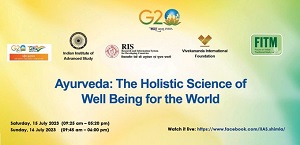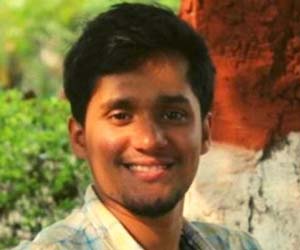On 15th and 16th July, 2023, Vivekananda International Foundation organised a National conference on the Ayurveda: Holistic Science of Well Being for the World in collaboration with IIAS (Indian Institute of Advanced Studies), Shimla and Research and Information System for Developing Countries RIS. This was a jointly organised G20/T20 advocacy event, conducted in hybrid mode.
As the conference title indicates, this event aims to highlight the critical role that Ayurveda can play in nurturing a holistic approach to health care globally. The conference's deliberations will facilitate the inclusion of Ayurveda in the G20 policy that discusses priorities in global health care.
Dr. Shashiprabha Kumar, Chairperson, IIAS, Shimla, who is the event’s Convener, also chaired the conference. Prof. Nageshwar Rao, Director, IIAS, gave the welcome address during the inaugural session and mentioned the importance of traditional medicine and lifestyle and how certain practices that might appear small can have a better impact when practiced for a long time. Dr. Rammanohar Vaidya, Director, Amrita School of Ayurveda the event coordinator explained the theme of the conference. He elucidated on how the world is undergoing a health crisis despite infrastructural developments and other kinds of progress that the health sector has made. This paradoxical situation calls for a holistic understanding of health, for which Ayurveda can be a major contributor to the world. The holistic model that Ayurveda offers for health intelligence, how it can bring a positive change to our lives, and the One Health discourse served as the theme for the conference. The inaugural address was given by Dr. Rajesh Kotecha, Secretary of the Ministry of Ayush. Dr. Kotecha invoked the concept of ‘One Health’, which calls for an integrated, interdisciplinary approach towards surveillance, treatment, monitoring, and mitigation in the health sector. Dr. Kotecha listed several aspects of Ayurveda that make us accessible to multi-dimensional well-being. The post-pandemic opportunities for traditional medicine worldwide were also highlighted in the inaugural address. Dr. Kotecha shared some of the collaborations that the Ministry of Ayush has made with WHO in this regard, before announcing the formal declaration of the event.
As a Guest of Honour, Dr. Sachin Chaturvedi, Director, RIS, mentioned the importance of opening TF-3 for domains outside economics and related professions to fields like philosophy, sociology, etc. He also invoked the concept of One Health and the problem of being human-centric in our approaches to development. He also mentioned the need to have a G20 forum for traditional medicine. Dr. Arvind Gupta, Director, VIF, also gave his address as a Guest of Honour, where he mentioned that Ayurveda shouldn’t remain as a Task Force engagement group of G20, but it should become a mainstream and popular practice thereafter. Another suggestion Dr. Gupta mentioned is that in the G20 outcome document, if a recommendation for an International Day for Traditional Medicine and Ayurveda is put forth, it will be a milestone for the development of holistic health. His address also mentioned the need for an international engagement with different systems of medicine, between allopathy and Ayurveda, and with countries where traditional medicine exists, for instance, Africa.
The inaugural session was followed by presentations by 17 speakers divided into nine sessions. Each session had distinct themes under which each speaker presented their titles. Each presentation was held for around 30 minutes, followed by 10 minutes of Q & A.
The first session was on ‘Ayurveda and Holistic Well-being’. The presentations under the theme revealed that the contemporary global health crisis could be viewed as a result of certain reductionist approaches that are there when it comes to health. The possibility of Ayurveda to fill those gaps in approaches to holistic health was explored. The presentation was by Dr. Rama Jayasundar and Dr. Rajeev Vasudevan.
The second session was on Ayurveda for Humanity, a person-centric approach. The session discussed the domain of Ayurgenomics, which gives a molecular framework for integrating genomics studies into Ayurvedic principles of inter-individual variability and accelerating the discovery of markers for predictive, preventive, and personalised medicine. The other part of the session focussed on reflections from Charaka Samhita on the subject of ‘person-centric approach’. The session was handled by two presenters, namely, Dr. Bhavna Parasher and Dr. Prasad M.
The third session on the Integration of Lifestyle and Diet in Ayurveda mentioned the dietary and lifestyle recommendations in Ayurveda and the knowledge of making food as medicine if taken appropriately. The non-medicinal side of Ayurveda was highlighted here. The session also touched upon how Ayurveda helps in healthy or delayed ageing based on dietary and lifestyle recommendations. Dr. Narayanan Nambi and Dr. Manjunath Nandi were the speakers for this session.
The fourth session on ‘Nature-Centred Treatment’ discussed the environment-friendly aspect of Ayurveda. The presentation highlighted the future and need of Ayurveda being rooted in its nature-centered principles to make it effective, efficient, and beneficial for the environment and the patients. Dr. Ramkumar Kutty was the speaker of this session.
The fifth session, based on ‘Ayurveda and Mental Well-being’, discussed the incompatibility of psychology to Ayurveda as Ayurveda looks at the mind from the realm of consciousness. Therefore, for Ayurveda to speak about mental well-being, it will have to take one step towards the Indian paradigm of psychology. The second part of the session discussed the future potential of Ayurveda in the field of mental health. The session was handled by two speakers, namely, Dr. P. Rammanohar and Dr. Suhas Kumar Shetty.
The sixth session on ‘Preventive and Predictive Medicine’ explained how Ayurveda is Preventive, Predictive, Personalised, and Participatory. P4 Medicine is a new paradigm emerging in the modern healthcare system and Ayurveda is an excellent example. The session had two speakers, namely Dr. Pratap Chauhan and Dr. Somit Kumar.
The seventh session was titled ‘Well-being of Aged Persons’ and discussed the role Ayurveda plays in longer life, and healthy ageing. The discussion showed several healing aspects of Ayurveda that are compatible with aged people, who are vulnerable and delicate. The presenters were Dr. B.S Prasad and Mala Kapur Shankardass.
The eighth session was based on the theme ‘Women and Child Health’ in which the integrated approaches to health, specifically women and child health were discussed. The role that traditional medicine in general could play in women and child health were also mentioned. The session was handled by Dr. Ruby Pawankar and Dr. Sarika Chaturvedi.
In the ninth session ‘Well-being of Herbal and Animal world: Vrikshayurveda and Ashwayurveda’, it was emphasised that Ayurveda is not a medicine specific for human beings. Rather it discusses animal health and plant health also. The written sources of the same were also mentioned in the session. The session had two speakers, Dr. Uma Vaidya and Vaidya Tarachand Sharma.







Post new comment